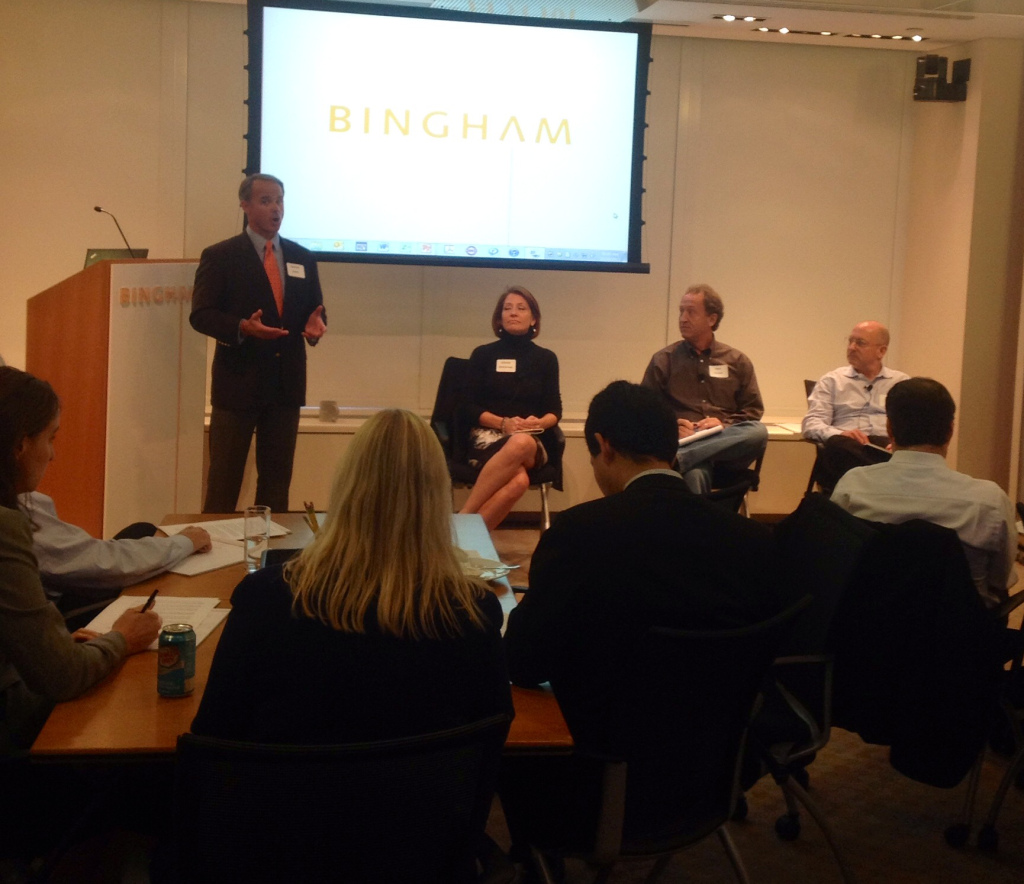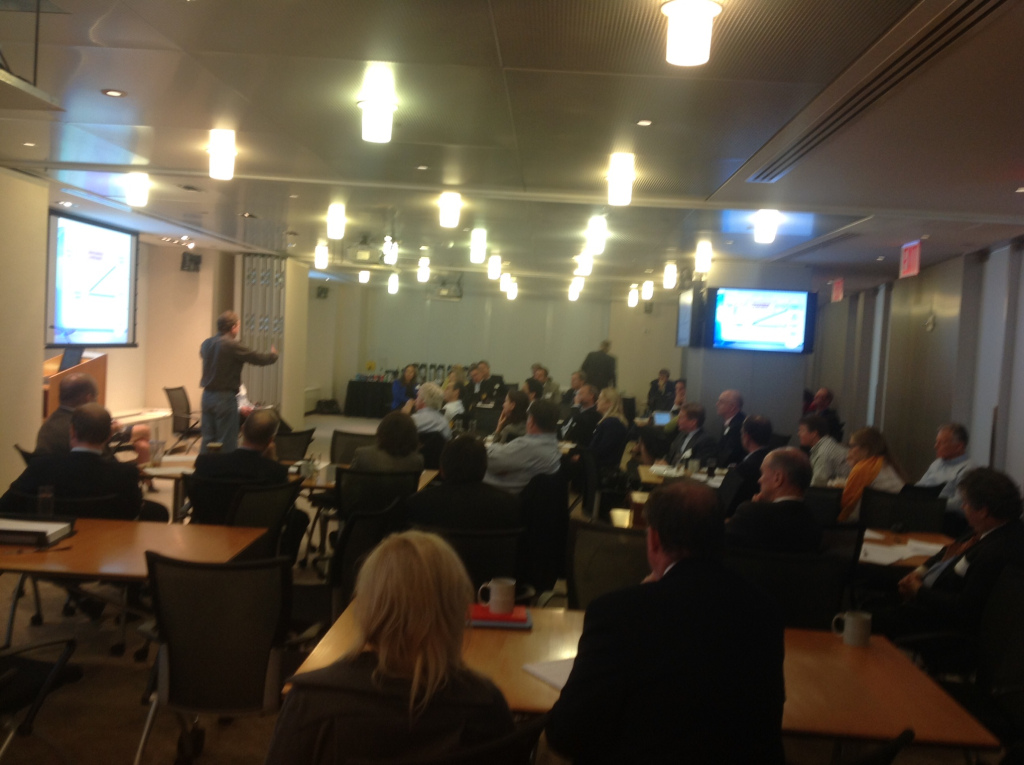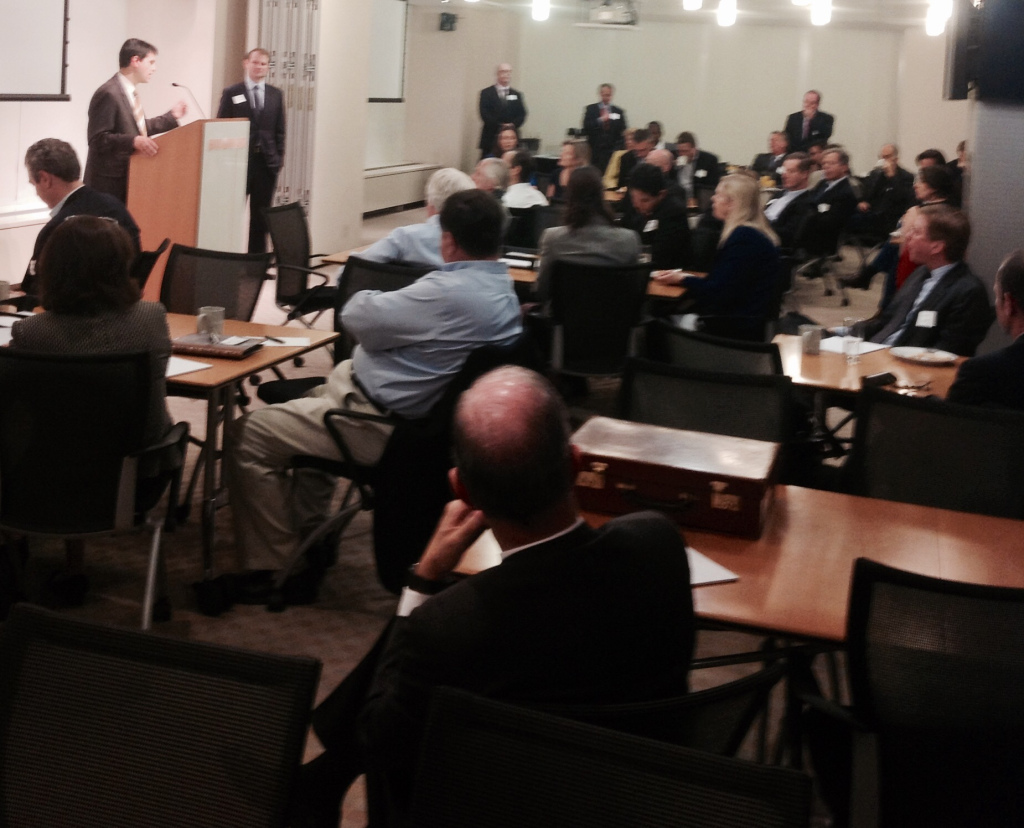
Recently, financial professionals Frazer Rice, Michael Devlin, Michael O’Callaghan, and David Wasson assembled a prominent group of thought leaders, venture capitalists and entrepreneurs for a wide-ranging dialogue about “impact investing” with approximately 60 high net-worth individuals, families and office managers. Frazer and his colleagues opened the event by urging everyone in attendance to share personal stories and to actively participate during a morning that would be spent exploring the multiple challenges and opportunities presented by merging philanthropic idealism with multi-generational wealth management.

Bingham McCutchen partner Steven Wilamowsky hosted the gathering in the main conference center at his law firm’s New York City headquarters. For Mr. Wilamowsky, the conceptual underpinnings of impact investing speak directly to his long career as a leading bankruptcy attorney – specifically, assisting debtors and creditors in creating plans capable of transforming financially distressed entities into future engines of growth. In his words: “Successfully restructuring even the largest and most complex of corporations is all about the boundless creativity of free people and free markets. I see no reason why a similarly innovative application of capitalist ideals couldn’t also revolutionize the ‘business’ of doing good.â€
Of course, most investors (or wealth managers) readily acknowledge that consistently generating profits is no simple task. Now imagine figuring out how to profit financially by doing something that traditionally (and almost exclusively) has been viewed as charity . . . Layers upon layers of new complexity and risk, right? Not so fast. There are numerous reasons why “Impact investingâ€Â has demonstrated tremendous promise even in areas where countless earlier strategies have fallen short.

Unsurprisingly, what took place over the next four hours was certainly no average panel discussion. As Frazer and his fellow organizers had hoped, the event quickly evolved into something more akin to a collaborative working group.

The entrepreneur best known for founding the popular “Ted Talks†series, Richard Wurman, helped set this cooperative tone by regaling the audience with an entertaining and informative series of anecdotes while illuminating the notion that “investing with impact†fundamentally demands a willingness to depart from conventional thinking – even urging the audience to become “excited about their own ignorance.†As an example of the power of non-intuitive thought, Wurman specifically cited historians’ reevaluation of the Black Plague’s impact on the development of western civilization – obviously a horrible humanitarian catastrophe but one that ultimately brought about a new era of rapidly expanding technological and political innovation. By constantly questioning assumptions, broadening our understanding and realizing that the most significant sources of change are often the least expected, impact investors possess a unique ability to reshape the world for the better.

Mr. Wurman was followed by Bill Milliken, founder of one of the nation’s most successful educational enrichment programs “Communities in Schools†(an enormous impact investment that has already grown from serving 100 students to more than one million). After relating his own inspiring personal story of rising up from the streets to addressing the United States Congress on the importance of educational reform, Mr. Milliken summed up his personal “impact investing philosophy” with an aphorism that, in many ways, perfectly captured the spirit of the event: “If we do good, then we will do well.â€

What sets impact investing apart, Milliken explained, is a recognition that incentives, long-term projects and constructive person-to-person relationships are not only more effective than “throwing money at a problem” but tend to generate more money anyway. Echoing Wurman, he also urged the audience to seek success in the least obvious – and sometime simplest – ways. One of Milliken’s greatest fundraising booms was owed to his realization that maximizing funding from wealthy donors sometimes requires little more than carefully listening to how those donors speak. By attaching the word “academy” (as opposed to “school”) to his specific projects, for example, donations jumped exponentially. The result? Exponential impact.
Next, Julianne Zimmerman, formerly a top NASA engineer and currently at the helm of the rapidly rising venture capital firm Vodia Ventures, explained her approach to unlocking alpha by tackling so-called “unsolvables†– environmental, economic, social and scientific challenges often left unaddressed primarily due to their size and complexity. For Ms. Zimmerman, however, it is precisely the scope of such challenges that makes them such appealing investments. After all, if a problem ultimately needs to be solved anyway (that is, it has a steepening cost curve); it’s primarily on the “back burner†due to a lack of public resources; and it’s likely to have a significant lifespan, impact investors have much to gain by stepping in early and reaping the monetary and philanthropic rewards that accrue from “owning†what become increasingly larger stakes in an eventual solution. Moreover, as Ms. Zimmerman witnessed many times during her work at NASA, it is not remotely uncommon to discover that solving even the smallest pieces of a challenging puzzle can lead to unexpected value – another powerful incentive for engaging in “moonshot investments.â€
Building on Ms. Zimmerman’s remarks, Mark Kendell the founder of Jiffy-Lube (among other enterprises) and the current CEO of Econova, Inc., next discussed his groundbreaking work developing new technologies capable of cleaning contaminated water. Unlike a number of other similar efforts launched by traditional charities and governments, however, Mr. Kendell’s particular technological breakthrough – enabled by a powerful combination of market-based incentives and investor oversight – has produced exponentially superior results – and with far lower input costs than had previously been imagined. “Put simply,†he declared, “impact investing is very real and very powerful.â€
Additionally, Mr. Kendell identified what he calls the “80/20 problem†– a conceptual hurdle that has hindered many worthy efforts from reaching their full potential. Specifically, around 80% of individuals and families who possess the ability and desire to make a positive impact lack the experience and guidance needed to do so. Meanwhile, roughly 20% – despite having sufficient passion and knowledge – believe themselves to be constrained by competing responsibilities. Any impact investment pitch, therefore, should involve plenty of careful listening AND equally careful explanations that are always audience-tailored.
Another version of the 80/20 divide exists at the institutional level. There are numerous large philanthropic organizations, for example, that possess tremendous resources, worthy goals and substantial institutional talent – in other words, 80% of what’s needed to complete a mission. Despite the fact that many such entities have delivered needed and positive results, too frequently, they still remain what Kendell refers to as “80%-ers†– institutions held back by an unfortunate combination of bureaucracy and inflexibility.
On the other hand, more entrepreneurial models – despite their “outside the box thinking,†relative flexibility and vibrant enthusiasm – haven’t exactly proven perfect either – especially those that lack the rigorous engineering approach somebody like Ms. Zimmerman brings to her various ventures. Without specifically defined goals, careful attention to realism and achievable timelines, a venture might generate tons of upfront excitement yet wind up mired in the quicksand of disorganization.

Mr. Kendell emphasized, however, that “injecting that 20%†(the passion, idealism, creativity, etc.) into one’s overall model is precisely what does lead to the most successful and even revolutionary advancements. To truly invest with impact, the wisest course is a 100% approach: embracing the creativity of entrepreneurial enthusiasm without forsaking the tried-and-true practices employed by the “best of the best†– both within the for-profit and not-for-profit sectors: “Innovation isn’t about ignoring the past – Innovation learns from the past in order to construct a better future.â€
As the morning came to a close, many participants remained at the conference center, continuing to mingle, network and further discuss impact investing among themselves and with the panelists.

Each of the seminar’s four organizers look forward to continuing this exciting exchange and already have future events in the works for 2014 (details soon). They would also be pleased to hold informational conversations or meetings with any interested parties.
Please feel free to follow-up by using the CONTACT button on the blog’s menu bar or by reaching out directly – phone numbers and email addresses to be added shortly.




